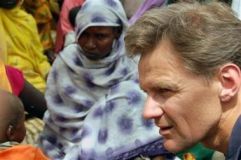UN seeks Sudanese help on Darfur aid
May 9, 2006 (KHARTOUM) — U.N. humanitarian chief Jan Egeland met Sudanese government officials on Tuesday to ask them to make it easier for aid workers to help refugees in Darfur.
 Days after a peace deal was signed between the Sudanese government and the main Darfuri rebel faction, Egeland asked Khartoum to ease travel restrictions and bureaucracy which have hampered aid workers in the past.
Days after a peace deal was signed between the Sudanese government and the main Darfuri rebel faction, Egeland asked Khartoum to ease travel restrictions and bureaucracy which have hampered aid workers in the past.
“The humanitarian operation is unsustainable … and we are here to work together with the government but they have to help us help their people,” Egeland, who met Humanitarian Affairs Minister Kosti Manyebi, told Reuters.
Tens of thousands of people have been killed and more than two million forced to flee their homes in Darfur since rebels took up arms in the western Sudanese region in 2003, triggering a revenge campaign of rape, looting and killing.
The United States has called the killings genocide, a term rejected by Khartoum.
Manyebi said big aid operations were always difficult but denied restrictions were deliberately imposed on aid workers.
“What we are trying to do is to bring all the ministries together … so that there is a one-stop shop for NGOs (non-governmental organisations) to come to,” he told reporters.
There are more than 13,000 aid workers in Darfur, one of the largest operations in the world. But food rations to millions were cut in half in May because of funding shortages.
Egeland said this cut would last until October, as donor nations had pledged money too late to stockpile food ahead of the rainy season from May to September when Darfur’s dirt roads become impassable.
He asked the government to help fill the food gap.
Manyebi said the government had already released 10,000 bags of food from its strategic reserves and would lend the United Nations more food, which the world body should pay back once the food arrived in later months.
Egeland also said he wanted the government and rebel groups to work towards reconciliation now a peace deal had been signed.
“My message to the elders in the camps, the government and the guerrillas: they have to calm things down and they have to do their utmost for reconciliation.”
On Monday, hopes the peace deal might ease the situation in Darfur were shaken by an outburst of violence when thousands of Darfuris attacked an aid worker during a visit there by Egeland.
They then ran riot and beat to death a Sudanese translator working for the 7,000-strong African Union force monitoring a shaky ceasefire.
The mostly non-Arab Darfur rebels accuse the Arab-dominated Khartoum government of neglect and two smaller rebel factions have refused to sign the peace deal.
African Union commission head Alpha Oumar Konare said that the peace deal was an important first step.
“It is an illusion to think that only because we have signed on agreement everything is concluded and decided upon. Peace, especially in the Darfur situation, will be a long process which will be won day by day,” he said.
“We would have liked to get more than we got, but what we have is a success,” he told reporters during a visit to Copenhagen.
(Reuters)
